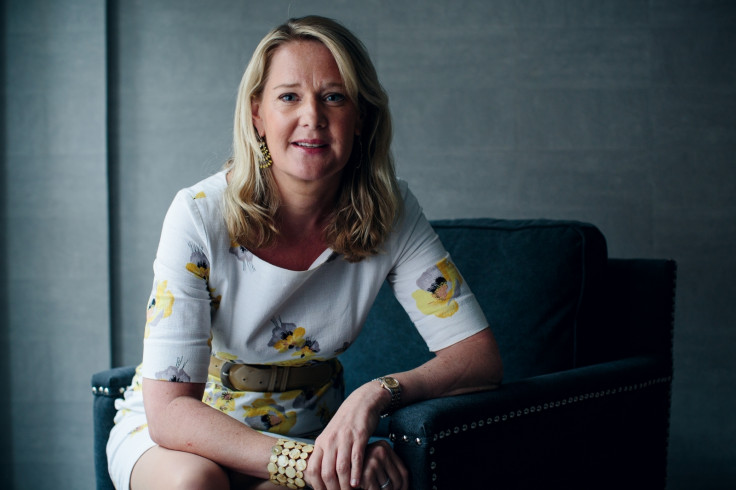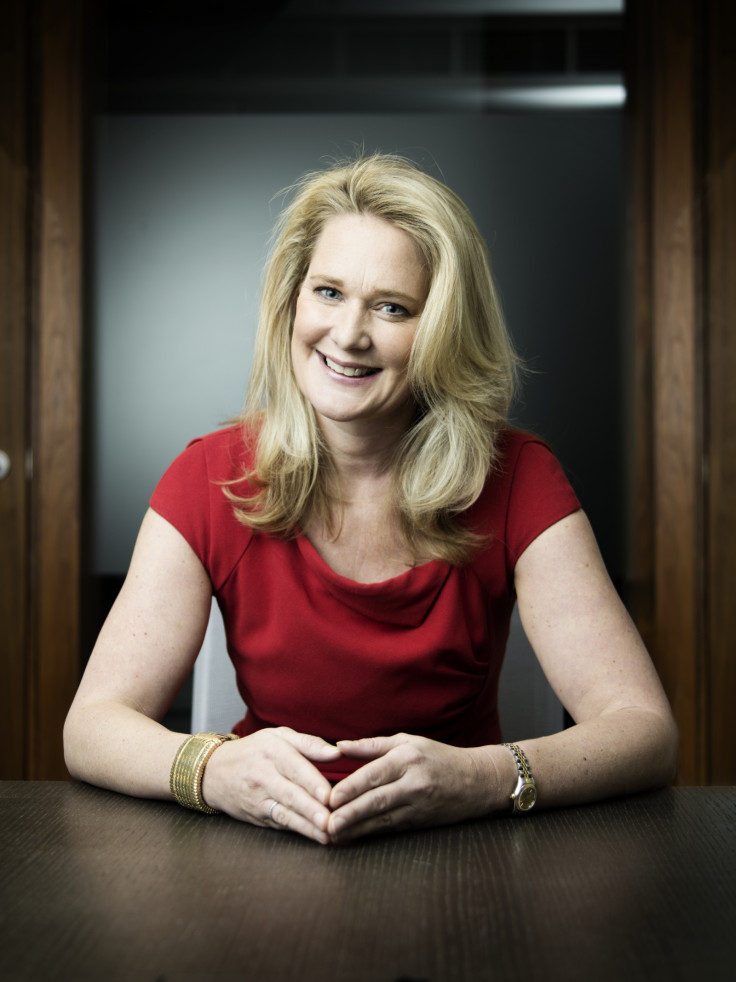'AIM-ing' high: Why FinnCap CEO Sam Smith is upbeat on UK Plc
The youngest and only female CEO of a City brokerage firm tells IBTimes UK it's time to dump Brexit alarmism and concentrate on positives.

There might be plenty of doomsday forecasters and Brexit alarmists around the City of London, but one maverick who's seen crises past up-close, runs an employee-owned brokerage, has an ear to the ground on the UK start-up scene and is generally 'pretty positive' on UK plc, has just about had enough of persistent naysayers.
Meet Sam Smith, chief executive officer of FinnCap, the top ranked broker for London Stock Exchange's Alternative Investment Market (AIM) and among the City's top five LSE advisers.
Speaking exclusively to IBTimes UK, Smith, 43, who also happens to be the youngest and only female boss of a City broker, says: "The UK is becoming extremely entrepreneurial as a nation. Every day we hear of new companies wanting to get off the ground and FinnCap is part of their journey.
"I know the media like to promote lots of negative stores but there are so many positive stories, and so many things the UK is good at. I see the right amount of market interest and investment going in those ventures.
"Of course, macroeconomic headwinds could bring some surprises and will there be a cyclical market correction – absolutely! But are they reasons enough to have an overwhelmingly negative stance on the road ahead – most certainly not! I find small and midcap companies to be in growth mode even in a relatively flat economic climate."
Smith also points to the level of UK innovation and how its courting interest. "Cambridge is only behind Stanford and MIT (in the US), and home to lots of entrepreneurial outfits. How it has morphed into the third-best innovation centre in the world is incredible. If such a setting does not continue to attract investment then what can?"
Correlating her own outfit's performance to the economic climate, Smith is upbeat about FinnCap's prospects. In the 12 months to April-end, it raised a total of £363m for companies such as Proactis, Nasstar, Horizonte Minerals, Ideagen and Seeing Machines, and has been involved in the initial public offering (IPO) of Tax Systems, Anglo African Oil & Gas, Van Elle, K3 and Velocity Composites.
"The appetite for fundraising has been far higher than in previous years which bodes well for the health of the IPO market. I've never been more excited about how things are, and what we can do. We have great momentum. There could be a relatively benign macro picture; every single year of the past 10 years has been tricky in market terms, and we're getting good at bouncing back from uncertainty."
Crises past and the summer of 2007
August 2017 brought with it sombre reflections of the global financial crisis of 2007-08 and umpteen 'where were you' musings of when BNP Paribas closed down several investment funds citing problems in the US securities market; largely deemed to be the start of the global financial crisis. Run on Northern Bank and the collapse of Lehman Brothers followed.
"The aftermath of the crisis probably accelerated our growth by five years. Before the crisis hit, the market was just coming out of the boom years and everyone was making money. As an unknown – which FinnCap was at the time – we could not have hired talent at the salaries we were able to pay.
Smith knew exactly where she was when the crisis emerged 10 years ago – in the process of founding FinnCap, by completing the buyout of JM Finn's corporate advisory and broking division.
"We did the buyout on 1 Aug 2007, and literally in a matter of weeks came BNP Paribas' clanger [9 August] and the collapse of Northern Rock. There was even a Northern Rock branch opposite our office; so we could see the queue of people lining up to pull their money out.
"Witnessing the first run on a British bank in 140 years right after the buyout was not what I could have ever imagined; I was 33 and very new to running anything."
However, Smith says finding "opportunity in a crisis" wasn't her cliché on a bumper sticker but reflected in reality.
"The aftermath of the crisis probably accelerated our growth by five years. Before the crisis hit, the market was just coming out of the boom years and everyone was making money. As an unknown – which FinnCap was at the time – we could not have hired talent at the salaries we were able to pay.
"But then the large players had to cut their staff quite dramatically, while we were hiring and we ended up getting talent we could not have hired for another few years in a boom market."
What FinnCap did have was an equity story, a vision of the future to sell, and the desire to be a proper service hub for small caps. By 2010, having started outside the top 20, FinnCap became the top ranked AIM broker.
Those hidden gems
The list of companies FinnCap offers broking services to stands at 125 and rising, and it has all been about being part of the "growth economy" and finding hiding gems in London's junior market.
While money matters, Smith says FinnCap's real purpose is to help ambitious companies grow. Things have moved on for AIM too, currently in its 21<sup>st year of operation. FinnCap has had a front-row seat for much of that time, and so has its boss for practically all of her working life, barring a short-stint at KPMG before she set off an entrepreneurial adventure.
"Comparing and contrasting with 1997, you now have completely different companies on the AIM. The average market capitalisation of an AIM-quoted company has massively increased to nearly $90m (£70m)."
The old association of the junior market with high risk, high reward punts on natural resource plays no longer holds true, more so, as the nature of resource companies seeking an AIM float has altered too.
"Earlier, oil and gas and mining companies were big constituents, and they were largely exploration firms and not even producers. So you had no price-to-earnings comparisons and it was all very much speculative. Admittedly, some subsequent spectacular failures gave the AIM a bad name.
Comparing and contrasting with 1997, you now have completely different companies on the AIM. The average market capitalisation of an AIM-quoted company has massively increased to nearly $90m.
"But what's happened of late is that not only do you have more resource producers and later stage resource companies; there are more technology and life sciences firms, and niche UK businesses with compelling stories listing on the AIM. So the IPOs you see coming these days are very different what you saw 10 years ago."
A lower pound has most certainly fired up the merger and acquisitions side of things and Smith thinks that will continue over the short to medium term.
Looking ahead, peer-to-peer (P2P) lenders in the fintech arena are starting to get real traction, reliability of profits and revenue streams to back-up their valuation and are ripe targets for IPOs.
"I think we'll see some of the big P2P lenders float in the next 12-18 months. Industrials and applied technology firms have always been the country's strength, and we'll see more on that front. K3 and Velocity Composites were two IPOs we recently worked on.
"The Velocity IPO was four-times oversubscribed while KBS' was three-times oversubscribed. There are two other IPOs we are currently looking at in the same sphere."
So that begs the question how does AIM's leading broker make a call on whom to back or not? "We generally reject a lot more companies that we take on as clients. We have 85 people working here and they are probably looking at 4-5 prospects everyday; so it's a lot of deal flow and a lot rejections.
"There are various considerations. The management team behind a company is always the number one thing. It's just fundamental – small and medium companies just don't grow unless they are backed by individuals who are ambitious, capable and can present well."

Examination of the product or business opportunity, and its unique selling point follow, before FinnCap makes a final call.
"The market crucifies you if do not live up to expectations, and it really rewards you if you under-promise and over-deliver. The latter are the kind of hidden gems we seek."
Quest for organic growth
Ultimately FinnCap's approach is exactly how the average investor should suss out a small to midcap company, Smith says. "I see AIM as the ultimate stock pickers' market. You can't buy an index on AIM.
"You have to pick the stock after intense scrutiny, adopt a bottom-up approach to the prospectus/corporate literature, and hope you are backing the right horse based on your diligence and examination of the company's prospects."
While the viewpoint about small caps is changing, they tend to go in and out of favour with analysts and institutional investors.
"I've seen too much of it over the last 20 years to be honest. Often big funds like BlackRock won't invest sub $100m, but sometimes they erratically do.
"At the moment, we see a lot of large City investors not just invest sub £100m, but sub £50m. Quite a large pool of capital is available; certainly one of the largest that I have seen in recent years."
And her top five sectors for growth? "I would put technology at the top of the pile, natural resources would be my number two recovery play, followed by applied industrials, life sciences and emerging financial companies."
Demand is out there and finding organic growth in large caps is really hard, Smith says. "On the contrary, small caps are growing quite fast. We see lots of companies looking to list on AIM that have 10-20% growth. Where else can you find that? So people seeking real organic growth have had to come down to the small caps."
© Copyright IBTimes 2025. All rights reserved.


















